'Don't ask, don't tell' ruled unconstitutional: First reactions
A federal judge says the military's ban on gay service members violates the First Amendment. What now?

A free daily email with the biggest news stories of the day – and the best features from TheWeek.com
You are now subscribed
Your newsletter sign-up was successful
The military's ban on openly gay service members is unconstitutional, a federal judge ruled Thursday. The 17-year-old policy — commonly known as "don't ask, don't tell" — violates gay troops' rights to free speech and due process, said U.S. District Judge Virginia A. Phillips of California, and has a "direct and disastrous effect" on the armed forces by serving "to impede military readiness and unit cohesion." The case was brought by the Log Cabin Republicans, a conservative gay-rights advocacy group, and argued against by the U.S. Justice Department. What is the impact of this ruling?
Puts Obama in a difficult spot: "This new ruling presents both a problem and an opportunity for Obama," says Chris Rovzar in New York magazine. While the president "objects to DADT," he believes "it should be overturned by Congress" after the military has had a chance to "follow through on studies" gauging the effects of a repeal. If Obama instructs the Justice Department not to appeal the ruling, DADT might "just go away" — but that would violate his own stated position. So, "in all likelihood," the administration will appeal the ruling.
Please, let this be the end: Because Justice Department attorneys were the ones fighting against this ruling, says Andrew Sullivan in The Atlantic, we now "have the Obama administration now actually battling Republicans to prevent gay servicemembers from serving openly." Consider this "one of the more spectacular backfires of political expediency in our time. I have no sympathy for [the administration]. End the ban now."
The Week
Escape your echo chamber. Get the facts behind the news, plus analysis from multiple perspectives.

Sign up for The Week's Free Newsletters
From our morning news briefing to a weekly Good News Newsletter, get the best of The Week delivered directly to your inbox.
From our morning news briefing to a weekly Good News Newsletter, get the best of The Week delivered directly to your inbox.
This judicial meddling could affect the fall elections: As far as "judicial overreach goes," says Allahpundit in Hot Air, this repeal of "don't ask, don't tell" isn't "quite as explosive as the Prop 8 ruling because a heavy majority (including a majority of Republicans) already supports letting people who are openly gay serve." That said, "if you’re looking for a little extra something to fuel this fall’s populist mojo, some legalistic jujitsu by an unelected judge against a longstanding national policy will do the trick nicely."
Don't expect this ruling to last: Between this ruling and the repeal of California's ban on gay marriage, says UCLA law professor Adam Winkler in the Huffington Post, "the tide seems to be surging for equal rights for all, regardless of sexual orientation." Unfortunately, this "latest landmark decision... may not stand for long." A "case of this magnitude could spark the interest of the Supreme Court," which is "historically reluctant to step on the military's toes." In the end, a Congressional repeal is probably the only way to end DADT.
A free daily email with the biggest news stories of the day – and the best features from TheWeek.com